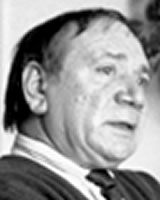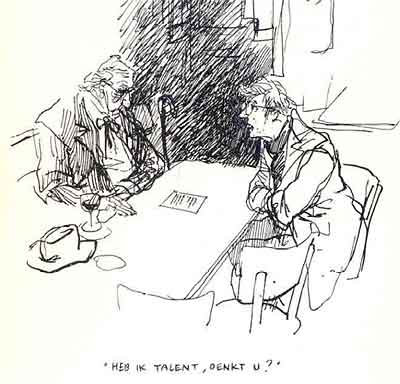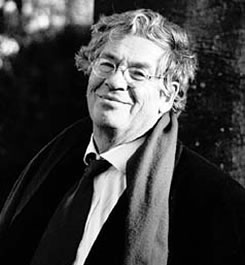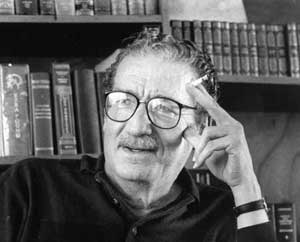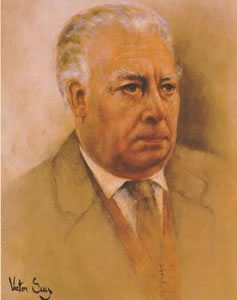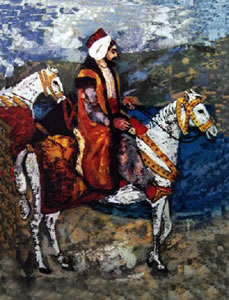De Vlaamse schrijver Pol Hoste werd geboren in Lokeren op 25 maart 1947. Zie ook mijn blog van 25 maart 2007 en ook mijn blog van 25 maart 2008.
Uit: Brieven aan Mozart
„M’n beste Mozart,
Vandaag gleed als een maan de zon door de niet telbare wolken en verticaal tegen de notelaar zat de specht. Wat verwacht iemand als ik?
De …* hebben me uitgenodigd terwijl ze naar Bretagne zijn en nu draag ik zoveel zorg voor hun huis en de tuin als ik voor de hele wereld zou willen hebben.
Is muziek iets anders? Ik probeer maar niet te denken aan de dag dat ik terug moet. Heb ik dan in de stad geen nieuwe vriendschap en een onafgewerkt boek achtergelaten? Wat voor iemand ben ik!
Weet je wat het is? Terwijl alles hier gedijt onder het licht, de schaduw, de stilte en de zachte warmte zal ik er ginder opnieuw helemaal alleen op moeten toezien, dat ik alles wat me aan het hart ligt niet weer eens in de vernieling help.
Nauwelijks één dag heeft het huis er over nagedacht om me te accepteren! Daarna mocht ik zelfs aan de kleine vleugelpiano plaatsnemen. Zoals je weet, kan ik de vingers niet eens behoorlijk op de toetsen houden. Verschrikkelijk is dat, want er is niets wat ik in mijn leven liever had gekund dan piano spelen. Een geluk dat de Duivel me nooit heeft aangeboden om in ruil voor deze const mijn ziel te verkopen, want lang zou ik niet hebben getwijfeld.
Hier is alles echter veel eenvoudiger. Dus heb ik gauw de eerste maten van één of ander stukje gespeeld dat ik me nog herinnerde, en ben voor de rest maar wat blijven dromen. Welke uitnodiging kan men afwijzen, wanneer er voor schaamte geen plaats is maar enkel voor vreugde?“
Pol Hoste (Lokeren, 25 maart 1947)
De Amerikaanse schrijfster Flannery O’Connor werd geboren op 25 maart 1925 in Savannah, Georgia. Zie ook mijn blog van 25 maart 2007 en ook mijn blog van 25 maart 2008.
Uit: Wise Blood
„Enoch Emery knew now that his life would never be the same again, because the thing that was going to happen to him had started to happen. He had always known that something was going to happen but he hadn’t known what. If he had been much given to thought, he might have thought that now was the time for him to justify his daddy’s blood, but he didn’t think in broad
sweeps like that, he thought what he would do next. Sometimes he didn’t think, he only wondered; then before long he would find himself doing this or that, like a bird finds itself building a nest when it hasn’t actually been planning to.
What was going to happen to him had started to happen when he showed what was in the glass case to Haze Motes. That was a mystery beyond his understanding, but he knew that what was going to be expected of him was something awful. His blood was more sensitive than any other part of him; it wrote doom all through him, except possibly in his brain, and the result was that his tongue, which edged out every few minutes to test his fever blister, knew more than he did.
The first thing that he found himself doing that was not normal was saving his pay. He was saving all of it, except what his landlady came to collect every week and what he had to use to buy something to eat with. Then to his surprise, he found he wasn’t eating very much and he was saving that money too. He had a fondness for supermarkets; it was his custom to spend an hour or so in one every afternoon after he left the city park, browsing around among the canned goods and reading the cereal stories. Lately he had been compelled to pick up a few things here and there that would not be bulky in his pockets, and he wondered if this could be the reason he was saving so much money on food. It could have been, but he had the suspicion that saving the money was connected with some larger thing. He had always been given to stealing but he had never saved before.“
Flannery O’Connor (25 maart 1925 – 3 augustus 1964)
De Amerikaanse schrijfster en sociale activiste Toni Cade Bambara werd als Miltona Mirkin Cade geboren op 25 maart 1939 in New York. Zij studeerde Engels en theaterwetenschappen aan Queen’s College en mime in Frankrijk. Later doceerde zij aan Rutgers University en het Spelman College. Haar eerste bundel korte verhalen Gorilla, My Love verscheen in 1972. In 1970 verzorgde zij de bloemlezing The Black Woman, een bundel gedichten, korte verhalen en essays van schrijvers als Nikki Giovanni, Audre Lorde, Alice Walker, Paule Marshall, en van Bambara zelf. Dit boek was zeer invloedrijk.
Uit: Those Bones Are Not My Child
“You’re on the porch with the broom sweeping the same spot, getting the same sound — dry straw against dry leaf caught in the loose-dirt crevice of the cement tiles. No phone, no footfalls, no welcome variation. It’s 3:15. Your ears strain, stretching down the block, searching through schoolchild chatter for that one voice that will give you ease. Your eyes sting with the effort to see over bushes, look through buildings, cut through everything that separates you from your child’s starting point — the junior high school.
The little kids you keep telling not to cut through your yard are cutting through your yard. Not boisterous-bold and loose-limbed as they used to be in the first and second grades. But not huddled and spooked as they were last year. You had to saw off the dogwood limbs. They’d creak and sway, throwing shadows of alarm on the walkway, sending the children shrieking down the driveway. You couldn’t store mulch in lawnleaf bags then, either. They’d look, even to you, coming upon those humps in your flowerbed, like bagged bodies.
A few months ago, everyone went about wary, tense, their shoulders hiked to their ears in order to fend off grisly news of slaughter. But now, adults walk as loose-limbed and carefree as the children who are scudding down the driveway, scuffing their shoes, then huddling on the sidewalk below.”
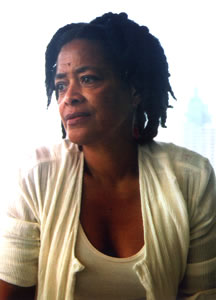
Toni Cade Bambara (25 maart 1939 – 9 december 1995)
De Franse dichter en schrijver Jacques Bens werd geboren op 25 maart 1931 in Cadolive (Bouches-du-Rhône). Zie ook mijn blog van 25 maart 2007 en ook mijn blog van 25 maart 2008.
Uit: 41 sonnets irrationnels
— Parlons clair : tu adoptes quoi comme système ?
Si tu préfères : tu mets quoi dans un poème ?
Ta philosophie ? Mmm ? Ton modus vivendi ?
— Des bruits, des sons, des mots, des pieds, des vers, des phrases.
— Oui, je sais. Mais ce n’est pas ça que je te dis.
Je parle des idées, comment dire ? Du thème,
Du…Ou plutôt, voici : dis-moi ce que tu aimes
Dans les vers honorés, méconnus ou maudits ?
— Les bruits, les sons, les mots. Parfois, une ou deux phrases.
Un sourire pincé, un cri, mais pas l’emphase,
Une fleur oubliée, un rire démentiel,
Une chanson, par-ci par-là, qui vient, qui jase,
Quatre regrets, mon cœur, et peut-être Pégase,
Ma jeunesse partie,
Mer,
Terre,
Soleil,
Ciel.
Jacques Bens (25 maart 1931 – 26 juli 2001)
De Nederlandse cartoonist en striptekenaar Peter van Straaten werd geboren in Arnhem op 25 maart 1935. Zie ook mijn blog van 25 maart 2007 en ook mijn blog van 25 maart 2008.
„Heb ik talent, denkt U?“
Peter Van Straaten (Arnhem, 25 maart 1935)
De Mexicaanse dichter en schrijver Jaime Sabines Gutiérrez werd geboren op 25 maart 1926 in Tuxtla Gutiérrez, Chiapas. Zie ook mijn blog van 25 maart 2007 en ook mijn blog van 25 maart 2008.
Pedestrian
It’s said, it’s rumored, they affirm it in the salons, at parties, someone
or many i
n the know, that Jaime Sabines is a great poet. Or at least a good
poet. Or a poet who’s decent, worthy. Or simply, really, a poet.
Jaime hears the news and he’s happy: how marvelous! I’m a poet! I’m an
important poet! I’m a great poet! convinced, he goes out or comes home,
convinced. But in the street, no one, and in the house, fewer: no one
notices that he’s a poet. Why don’t the poets have a star before them, or a
visible brilliance, or a ray of light shining from their ears?
My god, says Jaime. I have to be a father or husband, work in the factory
like others, or go about, like others, as a pedestrian.
That’s it! says Jaime. I’m not a poet. I’m a pedestrian.
And this time he hangs about in bed, sweetly happy and tranquil.
Vertaald door Athena Kildegaard
Jaime Sabines (25 maart 1926 – 19 maart 1999)
De Franse dichter en schrijver Jacques Audiberti werd geboren op 25 maart 1899 in Antibes. Zie ook mijn blog van 25 maart 2007.
Vera-Cruz
Ce petit qu’il faut qu’on fusille
on le mena devant la croix.
Cigarettes, blancheurs de fille,
il tira de sa poche, trois.
Une, il la mit à son esgourde,
l’autre à sa lèvre, puis en l’air,
il jette son chapeau qui tourne
comme le soleil du désert.
La troisième, soit une sainte,
sur le calvaire il la perdit.
C’est elle qui poussa la plainte
puisque les hommes n’ont rien dit.
Rempart
La vieille
Il naquit là dans la carrière
du Saint-Esprit, oui, là derrière.
Comment vendrait-il des poisons !
Son père faisait des maisons.
L’enfant, le soir, cherchait des astres,
comme on prétend que font les pastres,
blancs petits soleils de ciment
dans les cheveux, noir firmament
du maître au parfum de chaux grasse
que celui de l’aïl seul surpasse.
Jacques Audiberti (25 maart 1899 – 10 juli 1965)
De Vlaamse schrijver Filip De Pillecyn werd te Hamme aan de Durme geboren op 25 maart 1891. Zie ook mijn blog van 25 maart 2007.
Uit: Jan Tervaert
“Een troepje Franse soldaten stond te wachten aan de overzet van het Sas. De officier keek naar de rasse stroom en verderop naar de toren van Temse die nog even zichtbaar was door de rijzende nevel van oktober. De wassende vloed woelde door het wankende riet en zou welhaast de zandbank overspoelen waar een reiger in eenzaamheid stond.
Naast hem trappelde zijn paard; onrustig ging de blik van het dier naar het stijgende water van de inham. Het schurend gerucht van het tij en de kreet van een vogel vulden het wijde land. De zware rust van de dijken in de grijze namiddag dempte het luidruchtig gedoe van de soldaten die één voor één de banken vóór de herberg verlieten en naar het water kwamen staren dat van het noorden in gestadig bruisen kwam aanzwellen.
Het geklop van riemen weerklonk over de stroom en een grote platboomde schuit zwenkte af tegen de vloed. Twee mannen roeiden met gespannen lichaam stroomop door het rukkend geweld van de Schelde en lieten zich dan in een wijde boog meevoeren tot aan de inham; rustig naderden zij de kleine vlotbrug.
– ‘Eerst het paard,’ zei de officier.
Twee mannen hadden het achteruit steigerende dier bij de toom gegrepen. Het loensde schichtig naar de naderende schuit.”
Filip De Pillecyn (25 maart 1891 – 7 augustus 1962)
De Turkse schrijver Evliya Çelebi werd geboren op 25 maart 1611 in Istanbul. Zijn vader was de goudsmid met de hoogste rang in het paleis van de sultan. Çelebi kreeg dus een goede opvoeding en opleiding. Hij leerde ook het vak van zijn vader. Daarnaast had hij veel belangstelling voor muziek. In zijn geschriften berichtte hij over de talrijke reizen die hij door het Osmaanse rijk en de buurlanden maakte,
Uit: Im Reiche des Goldenen Apfels. Des türkischen Weltenbummlers Evliya Çelebi denkwürdige Reise in das Giaurenland und in die Stadt und Festung Wien anno 1665
„Als Sultan Süleyman, der großmächtige Chan, um an den unseligen Ungarn sowie an den Giauren deutschen Blutes Rache zu nehmen, i. J. 936 [1529-30] die Festung Wien höchstpersönlich belagerte, da ließ er sie von neun Fronten her aus unzähligen Donnergeschützen unausgesetzt unter Feuer nehme und ihre Widerstandskraft zermürben; es wurde mehrfach Sturm gelaufen, und schon war man in die Mauern eingebrochen, auf den Wällen erscholl bereits der muslimische Gebetsruf und schon war auch ein kühner Haudegen namens Çerkes durch eine Bresche, die die Geschütze gerissen hatten, auf seinem Rosse bis mitten in die Festung vorgedrungen, aber da feil der tapfere Çerkes samt seinem Pferde als Blutzeuge des Glaubens, die Giauren schlugen den Sturmangriff des muslimischen Heeres zurück und so wurde also der Hauptsturm auf den kommenden Tag verschoben.
Durch Allahs Fügung setzte jedoch am nächsten Morgen scharfer Frost ein, es fing an zu schneien und ein derartiger Schneesturm und Wirbelwind mit Hagelschlag brach hernieder, dass das ganze m
uslimische Heer unter diesen Schneemassen in äußerste Bedrängnis geriet“.
Evliya Çelebi (25 maart 1611 – na 1683 op een van zijn reizen)
De Engelse schrijfster Lady Anne Fanshawe werd geboren op 25 maart 1625 in Balls Park, bij Hertford. Zij was de echtgenote van (de latere Sir) Richard Fanshawe (1608 – 1666), een overtuigd aanhanger van de Royalisten die aan de kant stonden van Karel II. Na de dood van haar man schreef Anne Fanshawe haar Memoir (1676), voor gebruik in de familie, met name voor haar zoon. Het biedt een kleurrijk verslag van hun avontuurlijke leven en levert tevens boeiende details over kleding en de uiteenlopende gewoontes die zij zoal tegenkwamen tijdens hun reizen. The Memoirs of Lady Fanshawe werd pas voor het eerst volledig gepubliceerd in 1829. Een moderne editie verscheen in 1979.
Uit: The Memoirs of Lady Fanshawe
“It was in May 1645, the first time I went out of my chamber and to church, where, after service, Sir William Parkhurst, a very honest gentleman, came to me, and said he had a letter for me from your father and fifty pieces of gold, and was coming to bring them to me. I opened first my letter, and read those inexpressible joys that almost overcame me, for he told me I should the Thursday following come to him, and to that purpose he had sent me that money, and would send two of his men with horses, and all accommodation both for myself, my father, and sister, and that Lady Capell and Lady Bradford would meet me on the way; but that gold your father sent me when I was ready to perish, did not so much revive me as his summons. I went immediately to walk, or at least to sit in the air, being very weak, in the garden of St. John’s College, and there, with my good father, communicated my joy, who took great pleasure to hear of my husband’s good success and likewise of his journey to him. We, all of my household being present, heard drums beat in the highway, under the garden wall. My father asked me if I would go up upon the mount to see the soldiers march, for it was Sir Charles Lee’s company of foot, an acquaintance of ours; I said yes, and went up, leaning my back to a tree that grew on the mount.
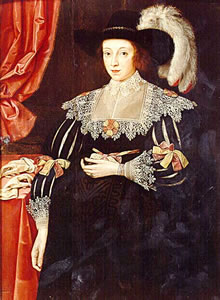
Anne Fanshawe (25 maart 1625 – 1680)
Portret door Marc Gheeraedts the Younger, 1679
De Italiaanse schrijver Antonio Fogazzaro werd geboren op 25 maart 1842 in Vicenza. Stammend uit een welgestelde familie, promoveerde hij in 1864 in Turijn in de rechten. Hij werkte daarna korte tijd als advocaat in zijn geboorteplaats, maar gaf dat al snel op om zich geheel aan de literatuur te wijden. Fogazzaro was aanhanger van het evolutionisme en het positivisme. In 1905 zette de kerk zijn werk op de index.
Uit: The Saint
„Jeanne was seated by the window with the book which she had been reading open upon her lap. She gazed pensively into the oval sheet of leaden water slumbering at her feet, at the passing clouds, casting their ever-changing shadows on the little villa, on the deserted garden, the trees of the opposite bank, the distant fields, on the bridge to the left, and on the quiet roads, which lost themselves behind the Béguinage, and on the slanting roofs of Bruges, grand, mysterious, dead.
Could it be that _l’Intruse_ of whom she had just been reading, that fatal, unseen visitor, was even now crossing the sepulchral city; could it be that the short ripples upon the face of the dark water were her shadow, while she herself had reached the threshold of the villa, bringing with her the coveted gift of eternal sleep! The church bells chimed the hour of five. High, high up, near the white clouds, magic
voices of innumerable bells sang over the houses, the squares, the streets of Bruges that melancholy incantation which renders its rest eternal. Jeanne felt two cool hands upon her eyes, a wave of perfume touched her cheek, a breath stirred her hair, whispering “_encore une intruse_,” and then soft lips kissed her. She did not seem surprised; and, raising her hand, caressed the face bending over her, saying: “Welcome, Noemi. _Magari fossi tu l’Intruse_,” (Would that you were _l’Intruse_.)
Noemi failed to understand.
“_Magari_,” she said. “Is that Italian? It sounds like Arabic. Explain at once, please.”
Jeanne rose. “You would not understand any better if I did,” she said with a smile. “Shall we have our Italian conversation lesson now?”
Antonio Fogazzaro (25 maart 1842 – 7 maart 1911)
De Duitse dichter en schrijver Daniel Schiebeler werd geboren op 25 maart 1741 in Hamburg. Een privéleraar bracht hem al vroeg in contact met een grote hoeveelheid Europese literatuur. Als jongeman beheerste hij al het Engels, Frans, Italiaans en Spaans. In Göttingen studeerde hij vanaf 1763 zonder veel enthousiasme rechten. Schiebeler schreef talrijke libretti en gedichten met vaak een komische inslag, of bootste antieke werken op ironische wijze na. Hij stierf al vroeg aan tbc.
Sonnet
Du forderst ein Sonett von mir;
Du weißt, wie schwer ich dieses finde.
Darum, du lose Rosalinde,
Versprichst du einen Kuß dafür.
Was ist, um einen Kuß von dir,
Das sich Myrtill nicht unterstünde?
Ich glaube fast, ich überwinde;
Sieh, zwei Quadrains stehn ja schon hier!
Auf einmal hört es auf zu fließen!
Nun werd ich doch verzagen müßen!
Doch nein, hier ist schon ein Terzett!
Nun beb ich doch – wie werd ich schließen?
Komm Rosalinde, laß dich küssen! –
Hier, Schönste, hast du dein Sonett.
Daniel Schiebeler (25 maart 1741 – 19 augustus 1771)
CD van G. P. Telemann met o.a werk van Schiebeler
(Geen portret beschikbaar)
De Engelse dichteres en schrijfster Mary Webb werd geboren als Gladys Mary Meredith in Leighton, Shropshire als dochter van een leraar die haar liefde voor literatuur bijbracht en een moeder die stamde uit een familie die gerelateerd was aan die van Sir Walter Scott.In 1912 trouwde zij met de leraar Henry Webb. Het succes van haar boek The Golden Arrow in 1917 stelde hen in staat in Lyth Hill, Bayston Hill land te kopen en er een huis te bouwen: Spring Cottage. In 1927 verlechterde de gezondheid van de schrijfster en liep ook haar huwelijk stuk. Zij stierf op 46-jarige leeftijd.
Presences
There is a presence on the lonely hill,
Lovely and chill:
There is an emanation in the wood,
Half understood.
They come upon me like an evening cloud,
Stranger than moon-rise, whiter than a shroud.
I shall not see them plain
Ever again,
Though in my childhood days
I knew their ways.
They are as secret as the black cloud-shadows
Sliding along the ripe midsummer grass;
With a breath-taking majesty they pass,
Down by the water in the mournful meadows;
Out of the pale pink distance at the falling
Of dusk they gaze–remote, summoning, chill;
Sweetly in April I have heard them calling
Where through black ash-buds gleams the purple hill.
Mary Webb (25 maart 1881 – 8 oktober 1927)
Zie voor onderstaande schrijvers ook mijn blog van 25 maart 2007.
De Zwitserse schrijfster en beeldhouwster Erica Pedretti werd geboren op 25 maart 1930 in Šternberk (Tsjechië).
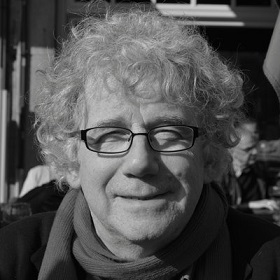

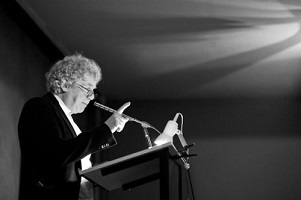
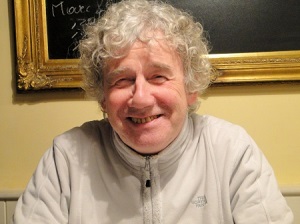
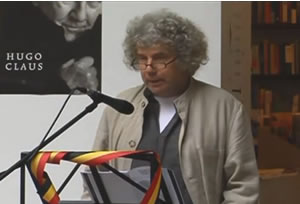
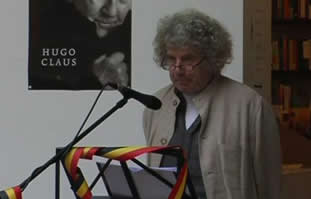
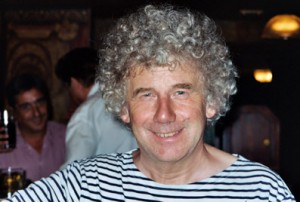
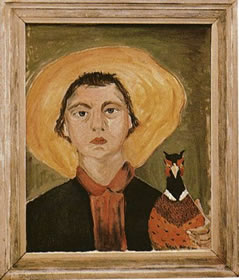
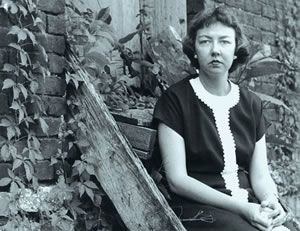






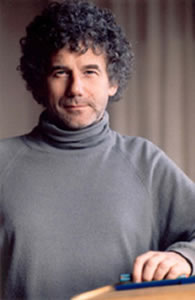
![flannery2[1] flannery2[1]](https://romenu.eu/wp-content/uploads/2018/05/09fd4-dyn001_original_270_300_pjpeg_2535747_e1bfefc86bc6fb6bd06d5f7dd2a290ba.jpg)

